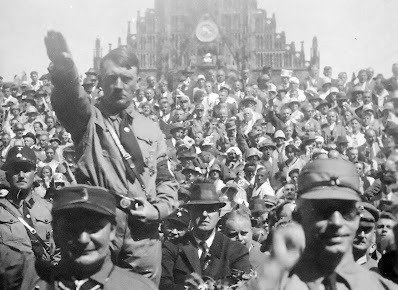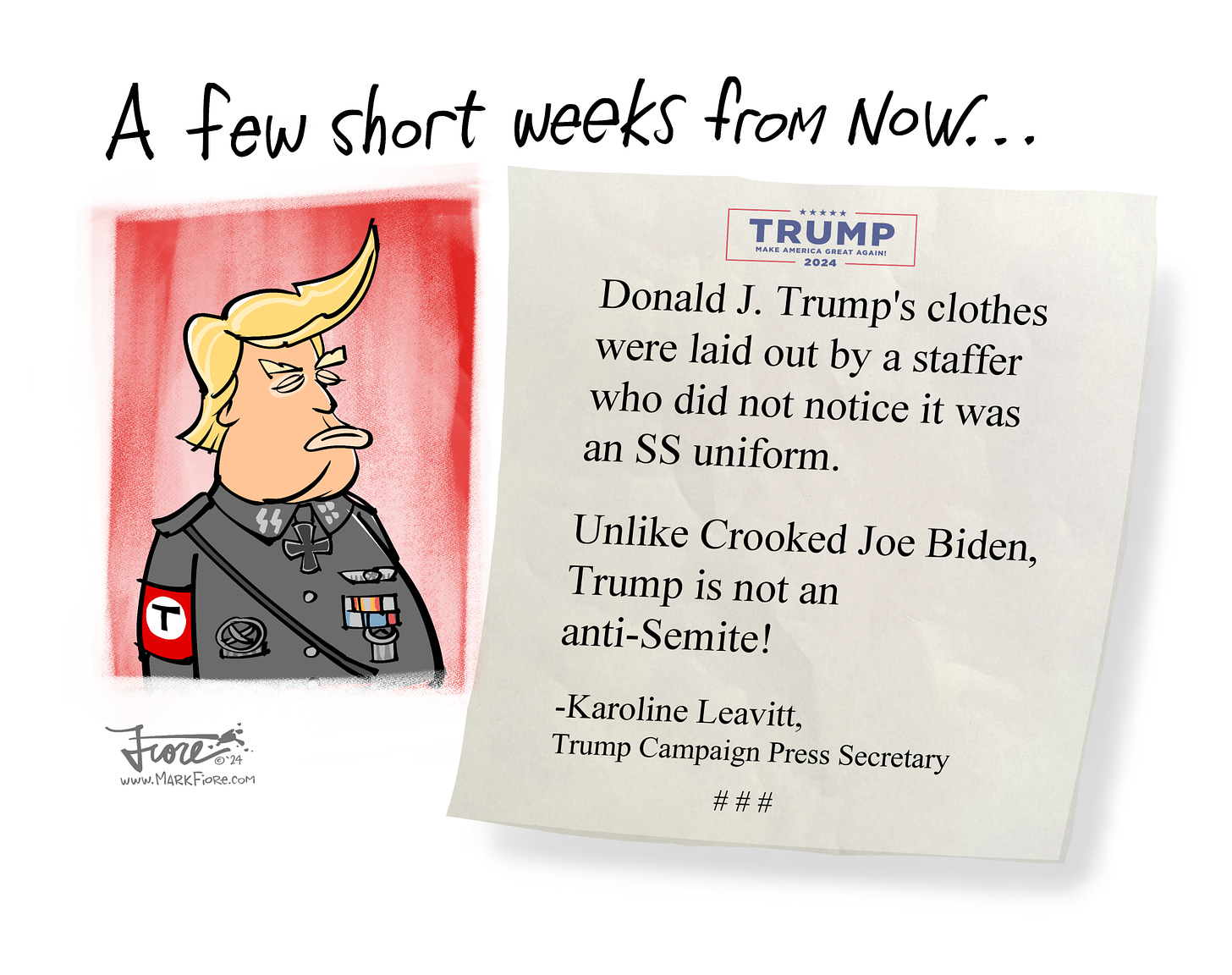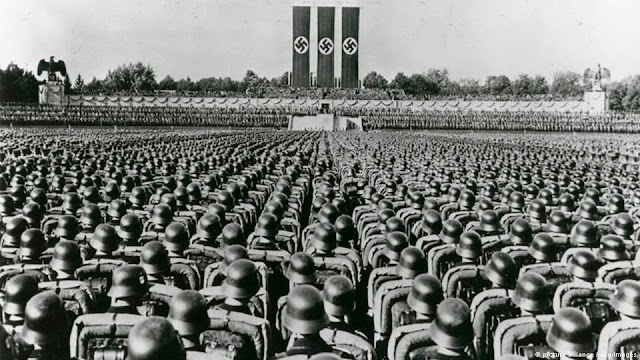The prosecution rested its case in Donald Trump’s hometown New York City state court hush money case. The case soon will go to the jury, unless Trump takes the witness stand.
Before the trial began, Trump was emphatic that he would testify, but this old lawyer, who clerked for a United States District Judge who presided over every federal prosecution in north Alabama, can’t imagine Trump's lawyers will let him take the witness stand, and once again, just because Trump said something was so, didn’t mean it was.
While I think Michael Cohen was a credible witness, because he admitted during his testimony and cross examination many things he had done wrong, there here is no way to know how the jury will decide the case, and it won’t surprise me if one or more of the jurors are Trump ringers who vote to acquit Trump, which will hang the jury and Trump walks.
Nor will it surprise me if the jury votes unanimously to acquit Trump, because they fear for their lives and the lives of their families, if they find Trump guilty.
Banana republic comes to mind.
As does Vladimir Putin’s Russia, Iran, Communist China and Iran.
I saw in my email newsfeed yesterday that Trump had floated serving three terms in the White House, then had said, no, he doesn’t want to challenge the 22nd Amendment to the U.S. Constitution, which limits U.S. presidents to serving two full terms.
After watching Trump on TV leading up to the January 6, 2020 coup attempt, I can’t imagine what would hold him back from challenging the 22nd Amendment.
Twenty-Second Amendment
Section 1
No person shall be elected to the office of the President more than twice, and no person who has held the office of President, or acted as President, for more than two years of a term to which some other person was elected President shall be elected to the office of the President more than once. But this Article shall not apply to any person holding the office of President when this Article was proposed by the Congress, and shall not prevent any person who may be holding the office of President, or acting as President, during the term within which this Article becomes operative from holding the office of President or acting as President during the remainder of such term.
Congress approved the Twenty-second Amendment on March 21, 1947, and submitted it to the state legislatures for ratification. That process was completed on February 27, 1951, when the requisite 36 of the 48 states had ratified the amendment (neither Alaska nor Hawaii had yet been admitted as states), and its provisions came into force on that date.
As I sit at my laptop wondering what I can find on “The Devil and Daniel Webster”, I see on CCN right now that President Biden is furious that the International Criminal Court (ICC) chief prosecutor Karim A. Khan said today that he was filing war crimes arrest warrant applications at the ICC for Israeli Prime Minister Benjamin Netanyahu and Israeli Minister of Defense Yoav Gallant, in addition to three senior Hamas leaders.
I wonder why Khan didn’t file a war crime arrest warrant application for President Biden, for giving Netanyahu and Gallant the money and weapons they used to cause Khan to file arrest warrants against them. In American law, accomplices to crimes, sometimes called aiders and abettors, are as guilty as the people who committed the crimes. For example, the driver of a get away car in a bank robbery is as guilty as the people who went into the bank and robbed it, and if they killed someone in the bank, the getaway driver is guilty of murder, too.
If Donald Trump ever gets tried in the Georgia court for tampering the Georgia 2020 presidential election, anyone who helped him do it can be criminally prosecuted under the same same Georgia law, which happens to be the Georgia RICO statute, racketeering influenced corrupt organizations, which historically was used to prosecute Mafia dons. The Georgia special prosecutor, Fani Willis, flipped a number of acomplices by giving them immunity in return for their testimony against Trump.
I thought that was the most dangerous criminal prosecution for Trump, because the evidence against him seemed compelling: he called a Georgia election official and asked the election official to find enough private citizen votes for Trump to win the Georgia election and Georgia’s electoral college votes.
If Trump is convicted by a Georgia jury, he can’t appeal to his friendly United States Supreme Court. He has to use the Georgia appellate court system. If the Georgia appellate courts affirm Trump’s conviction, he then could try to get the U.S. Supreme Court to intervene, based on a violation of his rights under the United States Constitution and Amendments thereto. But for the life of me, I cannot imagine what rights Trump had under the United States Constitution to meddle in the Georgia election.
If Fani Willis had kept her vagina in her panties, instead of frolicking with her lead prosecutor, I think Trump would be sweating bullets by now. Trump’s lawyers are trying to get Willis removed from the case for prosecutorial misconduct, of which she certainly is guilty, which is kinda amusing, given the well known history of Trump's penis.
The Georgia appellate courts might not agree with me on that, but in God’s Courtroom, it doesn’t matter what Fani Willis did with her lead prosecutor. What matters in God’s Court is what Trump did, and in that Courtroom Trump can’t refuse to take the witness stand or claim 5th Amendment protection against self-incrimination. Ditto for Joe Biden and the leaders of Hamas and Israel. Ditto for you and me, and everyone else.
Summary: “The Devil and Daniel Webster”
Written by American author Stephen Vincent Benét, “The Devil and Daniel Webster” is a variation on the Faust myth. Benét’s story tackles themes such as The Devil in America, Patriotism and the Limits of Loyalty, and The Nature of Justice. The story first appeared in The Saturday Evening Post in 1936, though it was later republished in Benét’s collection of stories titled Thirteen O’Clock in 1937. The story subsequently received the O. Henry Award, earning recognition as the best short story published that year. “The Devil and Daniel Webster” was directly influenced by Washington Irving’s “The Devil and Tom Walker,” another tale in the Faustian bargain canon.
This guide refers to the version of “The Devil and Daniel Webster” published by Fountainhead Press, which is a direct republishing of Benét’s original 1936 short story. A PDF of the story, with page numbers, can be found here. Content Warning: The story and guide reference enslavement.
The story opens with an unnamed first-person narrator describing what follows as a local legend in parts of New England. The narrator introduces Daniel Webster, a renowned lawyer described in godlike terms: “He never got to be President, but he was the biggest man. There were thousands that trusted in him right next to God Almighty, and they told stories about him […] that were like the stories of patriarchs and such” (1). The story then shifts focus to a chronically unlucky farmer named Jabez Stone. Stone lives in Cross Corners, New Hampshire, and all of his ventures seem to go astray. Eventually, Stone gets sick of his lot in life and expresses a desire to sell his soul to the Devil in exchange for better luck. While Stone immediately regrets his wish, it comes to fruition the following day, when a genteel man dressed entirely in black arrives at his door. This man is the Devil—he later introduces himself by the name of Scratch—and he comes to offer Jabez Stone seven years of good luck in exchange for his eternal soul. Despite his reservations, Stone agrees to the terms, using a pin to prick his finger and signing the contract in his own blood.
Thereafter, Stone’s luck dramatically changes; his farming endeavors are suddenly all prosperous, and Stone and his family become some of the most successful and influential people in Cross Corners. Stone is even asked to stand for selectman, a position of local government, and is considered as a potential candidate for state senate.
Nevertheless, Stone is haunted by his deal and reminded of his impending doom by Scratch’s yearly visits. In the sixth year of his contract, Stone challenges the terms of their agreement, bargaining for an additional three years of life before Scratch can claim his soul. Scratch agrees, and these years pass in turn. When Stone asks for additional extensions, Scratch refuses, and as his time dwindles, Stone seeks alternative ways to extricate himself from his deal, eventually seeking the help of Daniel Webster. After Stone tells Webster the terms of his deal, Webster agrees to represent him in a court battle against Scratch. Webster and Stone return to Cross Corners on the last night of Stone’s contract and are greeted by Scratch at midnight. While Webster is more than willing to go toe-to-toe with the Devil, Scratch insists that Mr. Stone’s contract is very clear and implores Webster to obey the law that he has dedicated his life to enforcing. Webster questions Scratch’s citizenship, insisting that “no American citizen may be forced into the service of a foreign prince!” (5). Scratch insists that he is not foreign, as Webster suggests, but an American citizen himself, citing his presence at various terrible events in American history as proof.
Granting Scratch’s American citizenship, Webster claims that Stone has the right to a trial by jury. Scratch agrees, so long as he is allowed to select the jury, promising that every juror will be an American citizen. Scratch’s jury of the damned then enters, revealing significant deceased figures from American history: Walter Butler and Simon Girty, both Loyalists during the American Revolution; King Philip, a Wampanoag chief who led a failed battle against New England colonials; Governor Thomas Dale, a dictatorial administrator of then-colonial Virginia; Morton of Merry Mount, a rival of the Plymouth Pilgrims; Edward Teach, more popularly known as the pirate Blackbeard; and Reverend John Smeet, assumedly an invented character by Benét. John Hathorne, who presided over the executions during the Salem Witch Trials, serves as judge.
Webster quickly realizes that Scratch has stacked the jury against him and Stone and begins to grow angry. Just as he is about to erupt, he realizes that this was Scratch’s intention: He hopes to capture Webster’s soul as well. Webster therefore calms himself and begins to speak of life’s simple pleasures: “the freshness of a fine morning when you’re young, and the taste of food when you’re hungry, and the new day that’s every day when you’re a child” (7). Webster suggests that all of these things are rendered meaningless in the absence of freedom. While Webster admits that America and her people have made many mistakes throughout their history, he argues that each of these mistakes has led to something bigger and better for the country. He concludes by suggesting that Scratch, or any devil, cannot possibly know what it is like to be an American or a human.
After a short deliberation, the jury announces that they have decided in favor of Stone and Webster even though the terms of the contract are clear. They admit that it was Webster’s eloquent testimony that swayed them in Stone’s favor. As the sun starts to rise, the jury disappears.
Scratch congratulates Webster on his victory and tears up Stone’s contract. Before Scratch can escape, however, Webster grabs him by the arm, demanding that he never return to New Hampshire to bother Jabez Stone, his family, his heirs, or anyone else in the state. Scratch agrees to these terms, though Webster continues to threaten him for some time afterward. Before leaving, Scratch offers to read Webster’s future from the palm of his hand. Webster allows this, and Scratch predicts that Webster will fail to attain his main ambition: to become president. He also says that Webster will experience a backlash after his final speech (a reference to Webster’s “Seventh of March Speech,” during which Webster announced his support for the Compromise of 1850).
Webster resigns himself to these eventual realities, trusting that his legacy will prevail. He goes on to ask Scratch if the Union, for which he has fought his entire life, will survive. Scratch says that Webster will not live to see the outcome of the struggle but that the supporters of the Union will prevail. Webster laughs at Scratch’s response before kicking him out the door. According to legend, Scratch keeps true to his word and never returns to New Hampshire.
Not even Daniel Wester could get Donald Trump off in God’s Court, nor Trump's many accomplices. Ditto for Joe Biden and Hamas and Israel's leaders. As for the Union surviving Donald Trump and Joe Biden, I suppose there will be a lot of head scratching before that is known.
sloanbashinsky@yahoo.com














